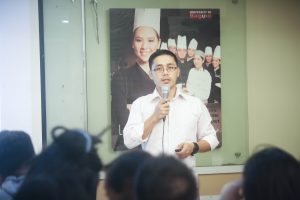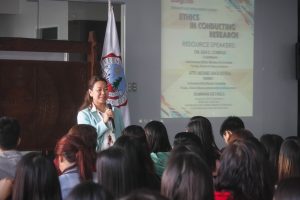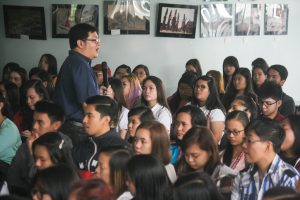The University of Baguio Research and Development Center organized two simultaneous seminars to promote understanding of the importance of social responsibility and ensure that ethical guidelines in conducting researches are always followed by the students and employees. The seminars were held on August 5, 2017 at the Centennial Hall for health researches and at the Café Fernando for social researches. There were 375 attendees including 12 faculty members from the different schools.
The seminar at the Café Fernando was attended by 23 students from the School of Business Administration and Accountancy, 40 from the School of Criminal Justice and Public Safety, 2 from the School of Engineering and Architecture, 39 from the School of International Hospitality and Tourism Management, 37 from the School of Liberal Arts and Human Sciences, 17 from the School of Teacher Education and 3 from the Graduate School.
Dr. Rhoda B. Galangco gave a brief discussion of the need to undergo ethical review. She mentioned that part of its purpose is to keep the conduct of the research safe for both the participants and the researchers.

Atty. Michael Jan B. Ostrea, a member of the Institutional Research Committee (IRC) of the University Research Board (URB) and faculty of the School of Law and School of Business Administration and Accountancy, started his lecture by defining ethics in the context of moral philosophy. He discussed the 5 basic moral principles of ethics according to Welfel and Kitchener. He highlighted the benefits of doing research and giving respect for the research participants.
On beneficence, Atty. Ostrea noted that a research should benefit the community as well the participants. On respecting others, he emphasized that one must respect every person’s point of view and should conduct researches that do not undermine the participants’ honor and reputation. On faithfulness or honesty, the researcher must be truthful in dealing with the participants.
As Atty. Ostrea discussed risk management, he emphasized that prospective research participants must be adequately informed of the possible benefits and risks of their involvement. Also, their participation is voluntary and they may discontinue at any time during the conduct of the study.
Atty Ostrea’s discussion on research ethics focused on the purpose and results, means, methods or modes as well as the specific subjects of ethical review and ethical considerations. “The main purpose of the ethical review is to remove from the research any offensive of harmful acts that may disgrace a person,” he shared.
Ms. Marilou B. Sannadan, member of the Institutional Ethics Review Committee (IERC) and faculty of the Senior High School, gave the closing remarks. She told the attendees that they may not remember what the speaker discussed, but assured them that they will surely recall the lesson when they will be conducting their own researches.
Meanwhile, the seminar held at the Centennial Hall was attended by 25 students from the School of Dentistry, 145 from the School of Natural Sciences, 27 from the School of Nursing.
Dr. Dhanna Kerina B. Rhodas, President of the University of Baguio, shared to the attendees that the conduct of research today is very different from how it was done in the past. Research manuscripts today need to be thoroughly reviewed. She also mentioned that it is part of being a student to develop oneself into becoming a researcher.
Dr. Jun C. Corpuz, Chairperson of the IERC of the University Research Board (URB) and faculty of the School of Natural Sciences, talked about the research ethics with his presentation entitled “Ethical Standards Involving Health”. He started his discussion by enumerating the characteristics of a research. On the importance of ethics in research, he shared a quote stating that “Rights, safety, and well-being of trial subjects are the most important considerations and should prevail over the interests of science and society.”
Dr. Corpuz discussed ethics as a moral behavior in conducting and utilizing researches. He also discussed how ethical  conduct makes research helpful and worthy and why research participants must be valued as persons. He used the documented researches in history as examples. He noted that the researcher has ultimate responsibility for ethical research even though controls exist at every level. The last part of the discussion focused on the role of research in the community and environment.
conduct makes research helpful and worthy and why research participants must be valued as persons. He used the documented researches in history as examples. He noted that the researcher has ultimate responsibility for ethical research even though controls exist at every level. The last part of the discussion focused on the role of research in the community and environment.
For the closing remarks, Dr. Maria Lourdes E. Cantor, member of the IERC and faculty of the School of Dentistry, emphasized that it is every researcher’s duty to abide by the policies and guidelines in research. – Lesner A. Ngagan, RDC
More pictures at https://facebook.com/UBRDC/albums/1617436861621706/

